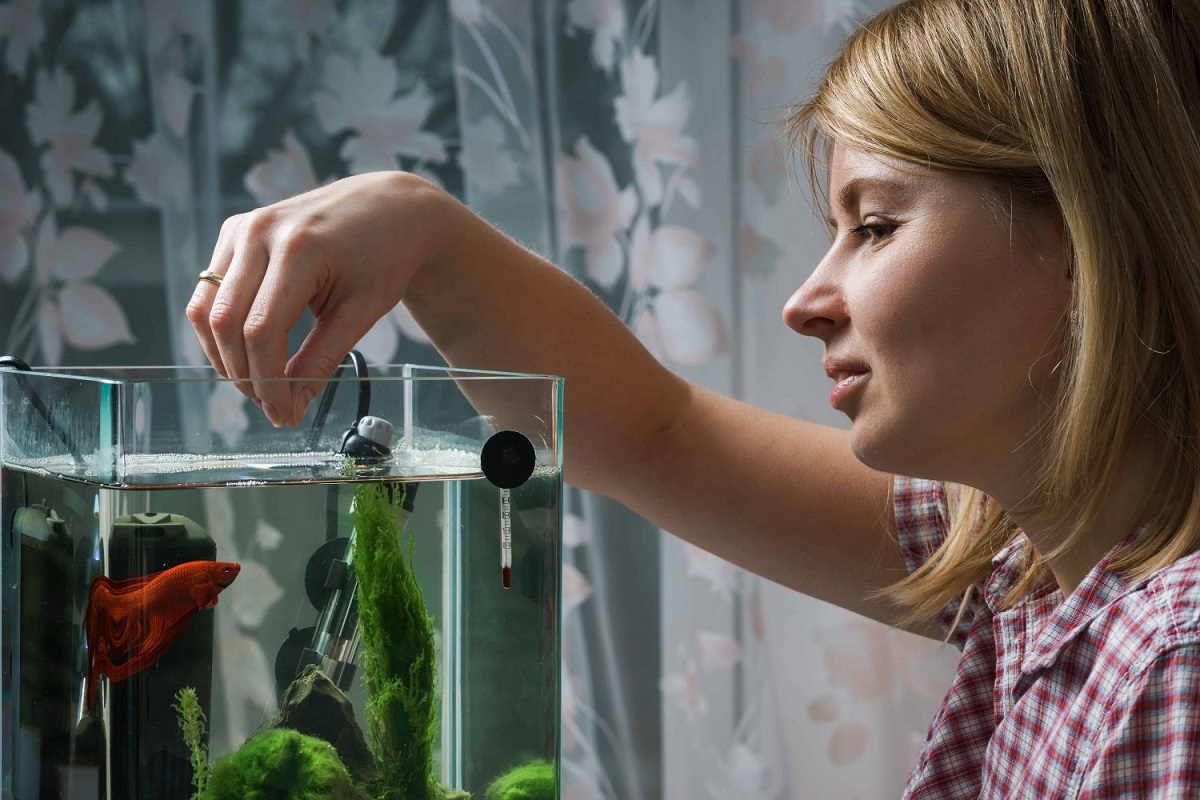With little or no prior knowledge, many people who own Betta fish tend to overfeed or underfeed their pets, leading to unhealthy body composition and weakened health.
Pet owners must pay strict attention to their nutrition to avoid this ailment.
Follow our Betta fish food guide with expert advice, tips, tactics, and other helpful information about feeding to understand how much and how often you should feed your Betta fish.
Contents
How Much To Feed A Betta Fish?
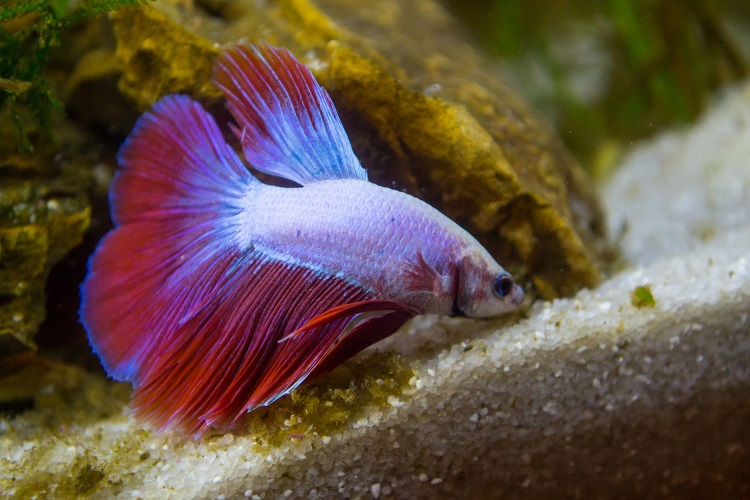
Owners must realize that Bettas have comparatively smaller stomachs and a relatively small digestive tract. Roughly speaking, their stomach is as tiny as their eyeball, so we highly recommend not overfeeding them.
Given the commercially available pellet size variation, any ideal recommendation should solely rely on the Betta’s size.
Feeding tiny amounts of foods, be it pellets, flakes, or freeze-dried food, will ensure that your pet isn’t bloated, constipated, or have an unhealthy gastrointestinal tract.
2-3 pellets are the most preferred quantity for any Betta to consume. Depending on your chosen diet, the final number can vary from 2 to 12 pellets daily.
Similarly, if the diet requires more than nine pellets, feed half the amount first.
Once they finish the first batch, continue to provide the remaining pellets, this food break-up will decrease the chances of any excess food sinking.
How Often To Feed A Betta Fish?

It is known that most tropical (herbivore or carnivore) fish spend most of their time foraging for food. However, owners must feed them daily since Bettas are not built for infrequent or large meals.
Ideally, feeding your Bettas twice a day is recommended for maximum nutrition. Some pet enthusiasts also prefer splitting their total daily amount into three feedings to keep their energy level constant throughout the day.
If you’re opting ‘twice a day’ schedule, consider feeding them once in the morning and once around the evening or night.
Each feeding session should have at least a 12 hours gap. Electing your fish to keep 24 hours fast every twice a month will only increase their stamina and overall health.
If your fish go through constant cycles of constipation, allowing them to fast in between shall make an incredible difference. However, avoid fasting them for two days unless it’s needed to treat a medical condition.
Even the tank’s temperature is closely related to their health, so continually monitor it throughout the day. A reliable thermometer with a spare heater will make the water temperature ideal and fit for the little Bettas.
It is common to see owners overfeeding their Bettas. Even overfeeding can be a problem showcasing severe health problems, further increasing the bio load on the tank’s filtration system.
This feeding feast is acceptable once in a blue moon, but overfeeding will indeed cause severe health conditions.
Moreover, the uneaten food usually drifts down to the substrate, breaking up, polluting the water, and harboring unnecessary bacteria in the ecosystem.
Similar to humans, Betta’s digestive tract needs some time to process the food, and constant feeding will only keep the track busy, further creating unnecessary complications.
Live fish food will quickly pass through the gastrointestinal tract, but fish pellets or flakes tend to swell up and pass slowly through their bodies. The slow process can accumulate food or cause blockages in Betta’s body.
Thus, the only way to keep their digestive system running is to let them fast under your observation. This fast won’t keep them hungry, as fish in dire conditions can easily survive one to two weeks without eating food.
Fasting will keep their tract healthy, digest the accumulated food and reset the stomach for the next food cycle. Avoid feeding them freeze-dried or frozen food constantly and limit it to only once or twice a week.
Lastly, consider a more nutrition-rich diet if you plan to breed your Bettas.
Weekly Schedule Recommendation
The following weekly feeding schedule is a rough recommendation that most Betta fish owners follow. However, feel free to change the quantity per your choice or the Bettas’ needs.
| Day | Quantity |
| Monday | 2-4 Betta fish pellets twice a day |
| Tuesday | 2-3 live, frozen, or freeze-dried pieces twice a day |
| Wednesday | 2-4 Betta fish pellets twice a day |
| Thursday | 2-4 Betta fish pellets twice a day |
| Friday | 2-3 live, frozen, or freeze-dried twice a day |
| Saturday | 2-4 Betta fish pellets twice a day |
| Sunday | Fast |
Can Betta Fish Overeat
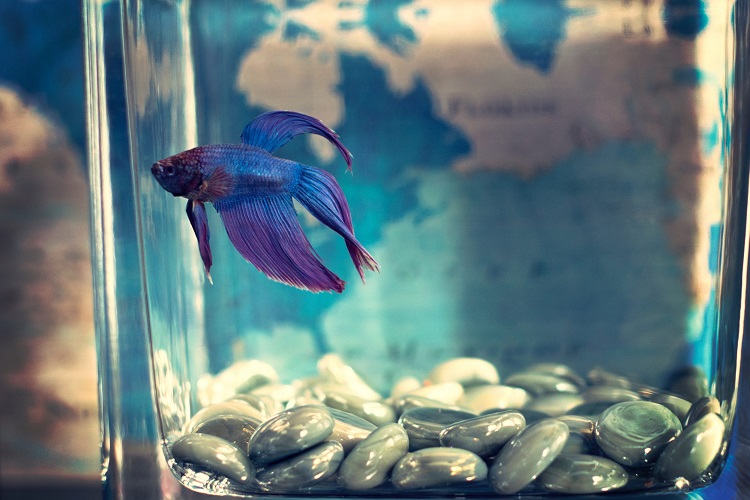
Yes, overfeeding your Betta is one of the most common issues Betta owners face regularly. Overfeeding can eventually lead to constipation giving rise to bloating or general discomfort.
Other symptoms may include a distended abdomen ( coelomic cavity ) and lethargy. Overeating may also lead to bladder dysfunction, so we highly recommend feeding your Bettas a strict diet containing the most nutritious food in limited quantities.
As mentioned previously, overfeeding will also affect your fish tank’s water quality and overall ecosystem. The uneaten food will decompose and can cause an ammonia surge in the tank.
Similarly, excess food also contributes to algae buildup as the food gets broken down into nitrates.
What Does Betta Fish Eat?
Feeding your Betta fish the correct amount is essential; however, providing the right food is just as important.
Proper food exclusively made for the Betta’s body composition is vital to improve its color, extend its life and keep the fish disease-free.
Since Bettas are carnivores, their diet must include many small insects and animals for correct nourishment.
Luckily, today’s market is filled with variety to keep the Bettas happy and content. However, always check the label of the store-bought food before feeding your pet.
Pay attention to the first ingredient of the packaged food, the total protein content of any given food should be at least 40% and preferably more.
Most foods that feature ‘fish meal’ are usually sub-par, while ingredients mentioning krill, herring, or salmon are always high quality. The following are some of the most nutritional food forms that you can feed your Bettas:
Betta Pellets
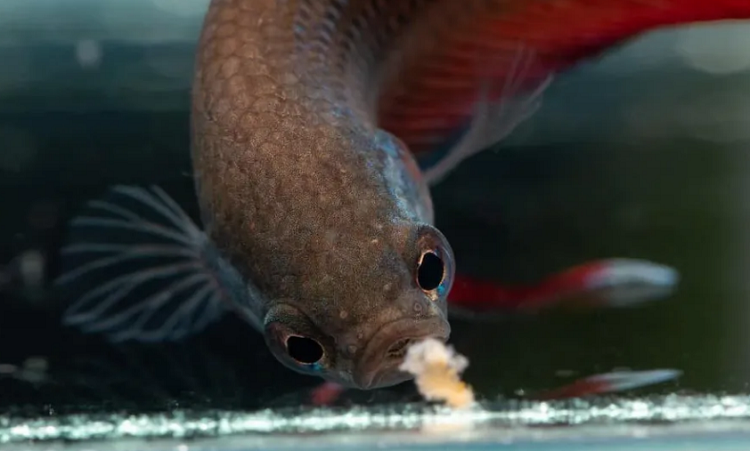
Pellets are undoubtedly the most cost-effective food type with good nutritional content. They are available in a myriad of sizes and flavors as per Betta’s liking. However, the most crucial feature of pellets is their shelf stability.
Once opened, the owners can easily use the pellets for up to six months. Most pellets are high-protein with natural additives. These small bite-sized pellets are of the perfect size and thus fit into your Bettas tiny mouth without any struggle.
Additionally, pellets float, so they don’t foul the tank while allowing your Bettas a lot more time to savor.
Another benefit of the Betta pellets is that they are widely available at all fish stores. Lastly, we recommend soaking the pellets in the water beforehand, as it will allow you to gauge the exact volume of the food before feeding them.
This little tip will discourage potential overfeeding and further reduce tank water contamination.
Betta Flakes
Betta flakes are one of the most easily accessible fish foods. They might be widely available at almost all fish stores but are comparatively less nutritionally dense than pellets or live fish.
Most Betta flakes sink once they contact the water, further discouraging the fish from eating the food. However, these flakes can be a great option when you wish to mix up the texture from time to time.
Ensure that flakes are not their primary diet as they lack nutritional value. Once a week is a fair turn to introduce a new texture into their dietary regimen.
Live Food
Live food requires a little preparation and effort, especially if the owners are worried about the quality.
You can buy live food at the fish store, but since they are alive, we do not recommend purchasing in bulk and storing them as it shall tamper with the quality and freshness.
Owners can opt for starter culture kits to raise their daphnia or baby Brine shrimp for their Bettas. However, we highly suggest feeding your Bettas live insects as they have the highest nutrient density of all the food types available on the market.
Mosquito larvae are one of the favorite parts of any Bettas diet. Your pet Betta will love these nutrient-rich larvae for their lunch or dinner. The second insect is Bloodworms; irrespective of the name, these aren’t worms but midge fly larvae.
You can find these tiny creatures in pools of stagnant water. Treat these Bloodworms as an occasional treat; they are rich in iron but lack amino acids.
Owners can also breed and grow Wingless fruit flies but pay attention to the flies’ environment. Most flies captured from nature may carry diseases that can harm your Bettas.
Our last suggestions are the Mysis and Brine shrimp. Both of these shrimps are relatively easy to grow in a DIY shrimp hatchery.
These tiny shrimps have heaps of fiber, vitamins, proteins, and necessary amino acids that are excellent for your pets.
Freeze-dried Food
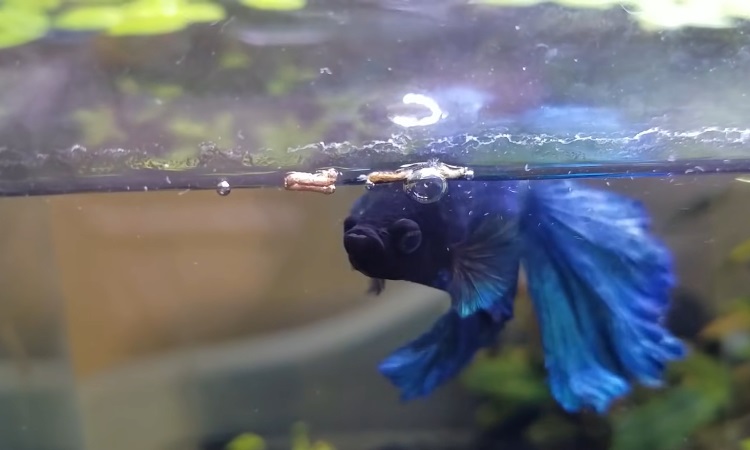
Freeze-drying happens when any live food is dried by removing all of its moisture. All freeze-dried foods retain their shape, thus making them very visually appealing to your Bettas.
These freeze-dried treats are more nutrient-dense than any pellet or flakes but aren’t as nutrient-rich as live or frozen food.
However, freeze-dried foods are an excellent alternative option if you don’t like the idea of feeding your Bettas live food.
Similarly, these foods are devoid of all the parasites and bacteria that are ideally found in live food.
Again this type of food should not be considered their primary food source as large amounts of freeze-dried insects can encourage bloating.
Frozen Food
Frozen insects are one of the ideal live food options for your Bettas to feed regularly. Manufacturers usually freeze these insects when they are alive, so the final product contains the most nutritional value.
Frozen fish foods are mostly pre-portioned in tiny cubes, allowing owners to feed the exact quantity.
Fish owners can buy a wide variety of frozen food, including Brine shrimp, Bloodworms, Mosquito larvae, Tubifex worms, and much more.
You can easily remove the cube from the packaging, let it thaw in the tank water, and feed the fish. Frozen Betta food is undoubtedly an ideal option if you’re looking for the most convenient way to feed Bettas some high-protein meal.
What’s The Best Food For Your Betta?
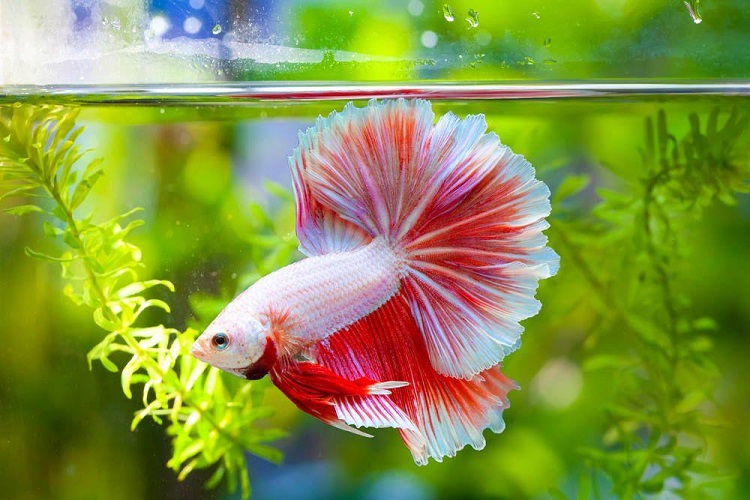
Live food is the most nutritionally ideal food source for any Betta fish. However, sometimes live fish aren’t the most practical option for busy Betta fish owners.
To tackle such situations, we recommend choosing frozen foods as the second-best alternative.
Frozen foods are nutrient-rich, and portioning is reasonably easy with the already cubed packets. Similarly, even freeze-dried food is a good option if you cannot get your hands on frozen insects.
However, pellets are the most economical and cost-effective food option for Betta fish. Lastly, consider treating them with occasion flakes to bring a slight change in their intake cycle.
How To Not Feed Your Bettas
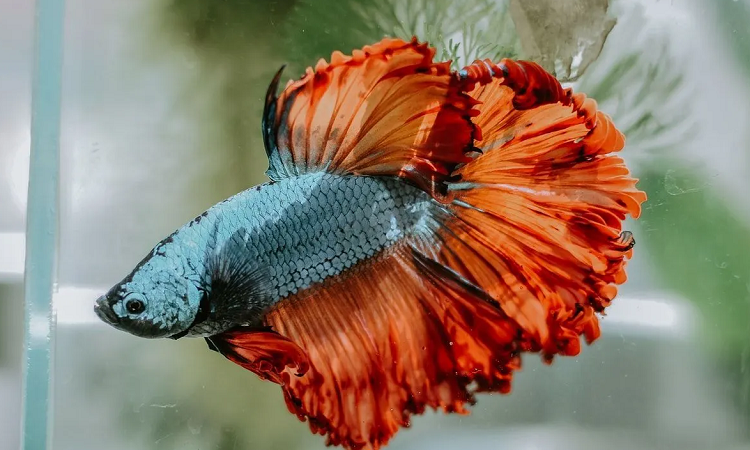
Keeping your playful Bettas well-fed and happy might seem easy; however, there are a few beginner mistakes that all Betta owners must avoid.
The first practice is to avoid following the ‘ five minutes rule. ‘ Since they always accept food, you will make your Betta obese. Avoid rewarding them with treats every time they jump, as they might hurt themselves.
Ask someone to feed your Betta manually instead of relying on an automated feeder. Sometimes feeders malfunction, which may starve your Bettas, especially if you’re out on a long vacation.
Finally, avoid re-freezing frozen food that has been thawed before; such exposure can promote bacterial growth.
Conclusion
We hope this article provided a lot of useful information about feeding your Bettas correctly. Always calculate the correct quantity by taking their gender, breed, and age into mind.
You can also try new foods and flavors, but keep in mind that their primary diet should consist of healthful meals.
We strongly advise owners to plan their Betta’s meals ahead of time and to include one-day fasting as an essential nutritional component for their general health.

Ian Sterling, founder of Fishlab.com, began his aquarium journey over 30 years ago, driven by a deep fascination for fish and their diverse personalities. His website, Fishlab.com, is dedicated to making fishkeeping accessible and enjoyable, offering beginner-friendly guidance, expert insights, and a community for aquarists to connect and share experiences.


